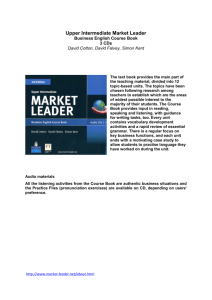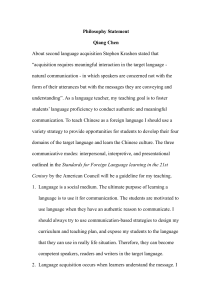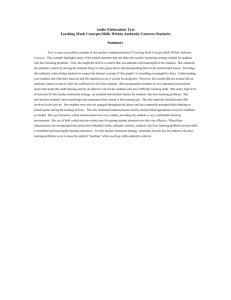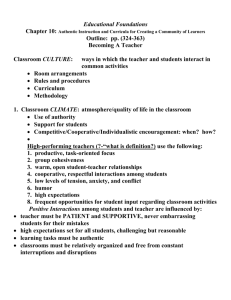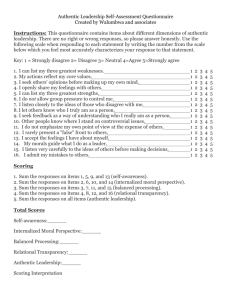Ch. 11: Authentic Leadership - Stage One Comps Study Group
advertisement
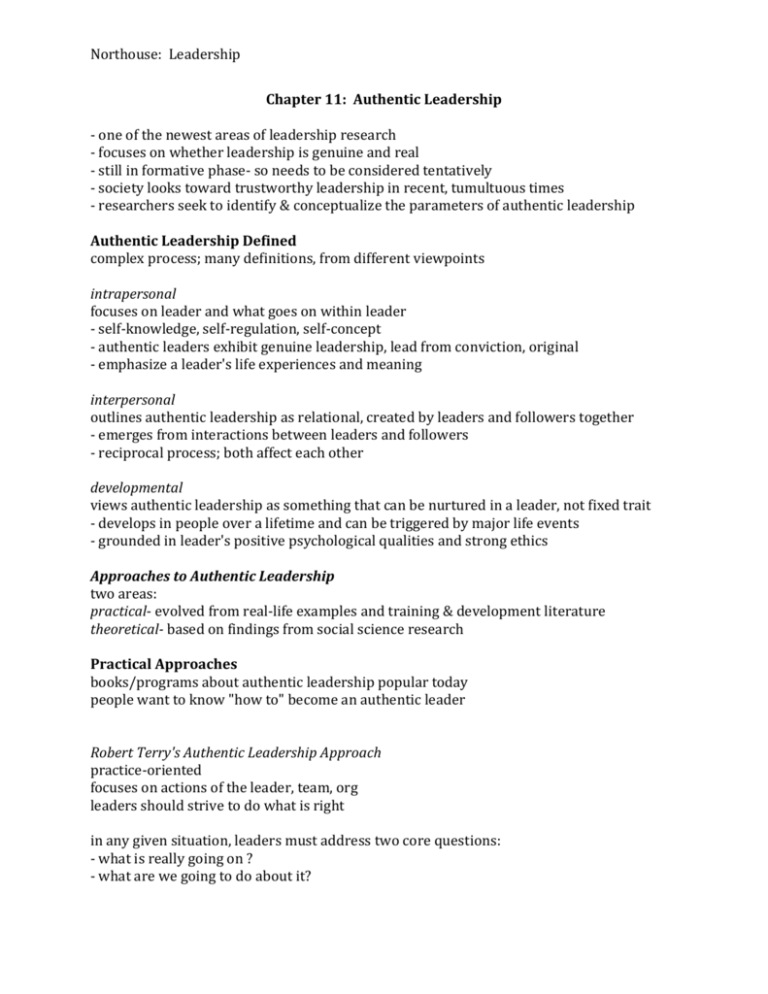
Northouse: Leadership Chapter 11: Authentic Leadership - one of the newest areas of leadership research - focuses on whether leadership is genuine and real - still in formative phase- so needs to be considered tentatively - society looks toward trustworthy leadership in recent, tumultuous times - researchers seek to identify & conceptualize the parameters of authentic leadership Authentic Leadership Defined complex process; many definitions, from different viewpoints intrapersonal focuses on leader and what goes on within leader - self-knowledge, self-regulation, self-concept - authentic leaders exhibit genuine leadership, lead from conviction, original - emphasize a leader's life experiences and meaning interpersonal outlines authentic leadership as relational, created by leaders and followers together - emerges from interactions between leaders and followers - reciprocal process; both affect each other developmental views authentic leadership as something that can be nurtured in a leader, not fixed trait - develops in people over a lifetime and can be triggered by major life events - grounded in leader's positive psychological qualities and strong ethics Approaches to Authentic Leadership two areas: practical- evolved from real-life examples and training & development literature theoretical- based on findings from social science research Practical Approaches books/programs about authentic leadership popular today people want to know "how to" become an authentic leader Robert Terry's Authentic Leadership Approach practice-oriented focuses on actions of the leader, team, org leaders should strive to do what is right in any given situation, leaders must address two core questions: - what is really going on ? - what are we going to do about it? Northouse: Leadership Authentic Action Wheel used to help get to underlying problems in orgs - locate problem, select response Bill George's Authentic Leadership Approach focuses on the characteristics of authentic leaders describes essential qualities of authentic leadership & how people can develop them five basic characteristics: understand their purpose- know what they are about, where they're going. they are passionate, truly care about their work understand their own values- behave toward others based on values. clear idea of who they are, their "true north". have strong relationships- capacity to open themselves up and make connections have self-discipline- focus and determination, clear standards, helps reach goals - they are consistent. predictable in behavior, so people know what to expect and find them easer to communicate with. have compassion- heart. sensitive to plight of others, open self, willing to help Theoretical Approach still in initial stages of development, but theory is emerging Background interest has been around a while, but research is recent first articles sparked from Gallup Leadership Institute summit interest in authentic leadership increased during time of societal upheaval and instability in US (9/11, Enron..) - need more human, constructive leadership that serves common good definition- p.262 different models: Gardner et al; Ilies, Morgenson, & Nahrgang; Luthans & Avolio Components of Authentic Leadership self-awareness - understand self, strengths & weaknesses, reflect on core values - provides anchor for decisions and actions internalized moral perspective - use own moral standards to guide behavior, not outside pressures - shows they are consistent with expressed beliefs and morals Northouse: Leadership balanced processing ability to analyze info objectively, weigh perspectives before making decision relational transparency - open and honest in presenting self to others - share core feelings, motives, positive & negatives aspects of self Factors that Influence Authentic Leadership four key positive psychological attributes that impact authentic leadership confidence - self-efficacy, belief one can successfully accomplish a task hope optimism resilience moral reasoning - capacity to make ethical decisions about issues of right or wrong critical life events - understand own life experiences, makes leader more authentic how it works - approach provides prescriptions for how to be authentic - describes what authentic leadership is and what accounts for it Strengths fulfills society's need for trustworthy leadership provides guidelines to become authentic leader explicit moral dimension values and behaviors can be developed in leaders over time can be measured using ALQ- Authentic Leadership Questionnaire Criticisms no empirical base, not tested for validity moral component not fully explained researchers question whether positive psychological factors should be included not clear how authentic leadership results in positive organizational outcomes
